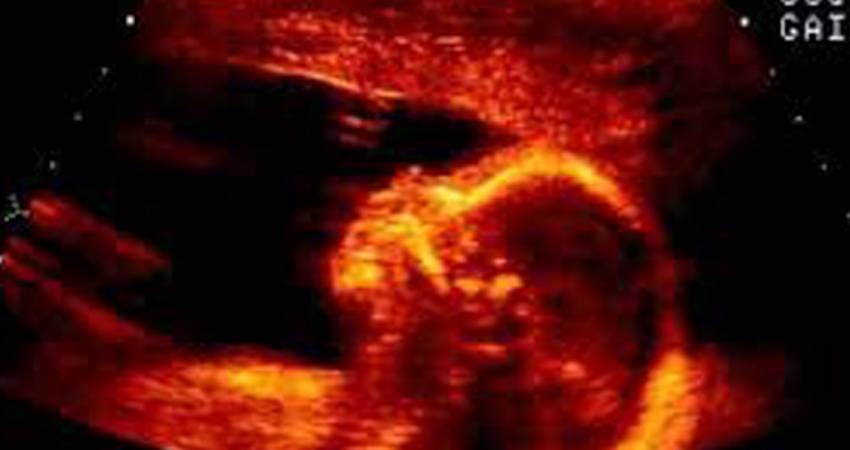
What happens to the bodies? The question the media won't ask Harris on abortion
It should come as no surprise that the Health Committee tasked with examining proposed amendments to Simon Harris’ ‘termination of pregnancy’ legislation spent most of the time discussing everything except abortion itself.
This political tactic of deflection is as old as the hills, of course. It’s particularly useful in this instance because abortion supporters would rather debate dozens of amendments dealing with men becoming pregnant than risk drawing any public attention to the reality of what will happen under the new regime in Ireland.
Pro-abortion TDs worked themselves into a lather of pretend outrage when perfectly reasonable amendments, such as one banning abortion on disability grounds, were proposed.
Every amendment that might offer information or assistance other than abortion was labelled misogynistic or disgusting or horrific by Harris and his crew.
The whole exercise was a complete charade, and not even the thuggish lefties rooting for abortions for any reason, at any time, were bested by Harris in his sneering, contemptuous and often vicious attitude towards any pro-life proposal.
The Minister was caught out, however, when he tried to demonise pro-life TDs by describing the phrase ‘cooling-off period’ (in relation to a three-day period of reflection before undergoing abortion) as “horrific”, but was reminded by Independent TD, Mattie McGrath, that the term was used by his colleague, the Tánaiste, Simon Coveney during the debate.
Harris, Deputy Kate O’Connell and others were particularly incensed by an amendment which sought to ensure that “the Minister shall make regulations to provide for the dignified disposal of the bodily remains of foetuses which have been the subject of terminations of pregnancy”.
The amendment also sought to prevent the sale of foetal body parts, an issue which has caused huge controversy in the U.S. when abortionists were caught on camerahaggling over prices for an aborted preborn child’s eyeball or liver.
“A person who sells or offers to sell a foetus or the bodily remains of a foetus which has been the subject of a termination of pregnancy or any part thereof shall be guilty of an offence,” the amendment suggested.
As Danny Healy Rae noted: “The amendment is very reasonable and is asking for nothing more than dignity for the baby.”
In response, there was a collective shriek of fury from the abortion-supporting TDs present.
It was “grossly offensive”, “grotesque” and “upsetting” said Simon Harris, who seemed to think that a baby at 10 or twelve weeks gestation would not have a body to dispose of. He conveniently ignored the provisions for surgical abortions (sometimes up to birth) in his bill, and then accused pro-life TDs of trying to criminalise women and oblige them to make funeral arrangements even though Peter Fitzpatrick TD pointed out that the amendment “does not require women to have a funeral. We aim to put an obligation on the hospital to bury or cremate the remains with dignity.”
How could anyone find fault with that? Why should a hospital not have an obligation to treat the body of an aborted baby with dignity? In 2016, Channel 4’s Dispatches reported that the bodies of aborted babies were burned in ‘waste-to-energy’ plants which generate power for heat.
There’s a sad reality to all this that the Committee wishes to ignore – and, more significantly, that they hope the public will ignore. Abortion isn’t a magic wand that wishes a baby away. There are, distressingly, broken little bodies at the end of the procedure, and they must be disposed of. The media, in its role of serving the public interest and ensuring an informed debate, should be asking Harris how they will be disposed of, but we don’t have a fair or balanced media in this country.
A week after the Health Committee dismissed the amendment, however, an article appeared in the Irish Times which gave an insight into the thinking of those who refuse to afford dignity to the remains of babies who are aborted. The author, George Winter, welcomed the repeal of the 8th, and said “one outcome will be a rise in the number of foetuses aborted in Ireland.”
He spelled out those numbers: “For example, 26 lawful terminations were performed in Ireland in 2014, while, in 2016, an underestimated 3,265 women and girls who attended abortion clinics in England and Wales gave addresses in Ireland.”
And then concluded: “For medical researchers, the expected surge in foetal material represents a considerable source of pathological bounty.”
Although Mr Winter’s assertions may be hideous, they are at least honest. We need to hold Simon Harris and his crew to account for their dishonesty and denial when the practise of what happens to the bodies becomes clear.
Featured
- Abortion coercion has arrived in Ireland – the NWC are silent
- Review of at-home abortions 'needed after coercion case'
- French Govt to remind 29-year-olds of biological clock
- Huge factor in decline in primary school numbers ignored
- Germany Denies Promoting Abortion Abroad—While Funding Pro-Abortion NGOs
- Govt don’t oppose Coppinger abortion bill at 1st stage
- March for Life: Vance, the White House, and a Divided Pro-Life Movement
- Paris’ Annual March for Life Puts Euthanasia in the Spotlight
- Britain’s seemingly limitless abortion rate
- The importance of the work carried out by Every Life Counts
- Puerto Rico officially recognizes unborn children as ‘natural persons’
- Assisted suicide laws stalled by “complex” legal issues
- Yes, that hideous celebration of 300 abortions is real
- White Crosses Memorial: Dungarvan once again pays its respects to our aborted babies
- Josiah: Abortion Survivor
- Rally for Life 2025


























